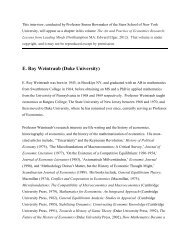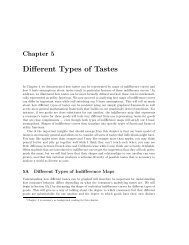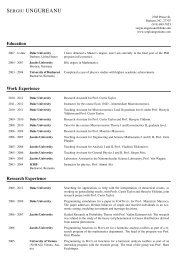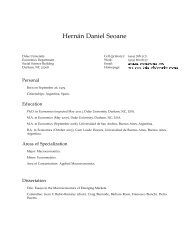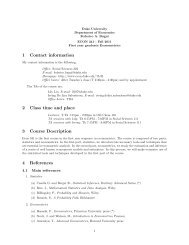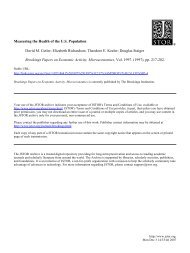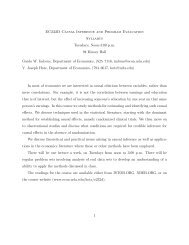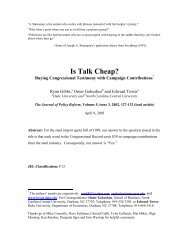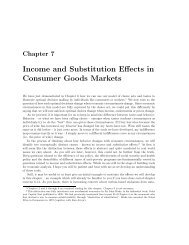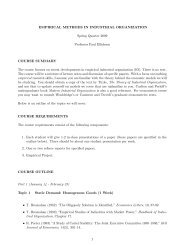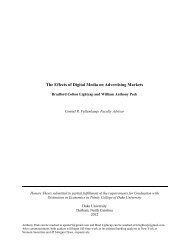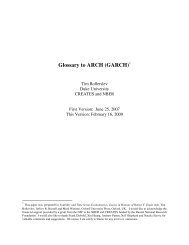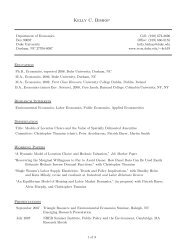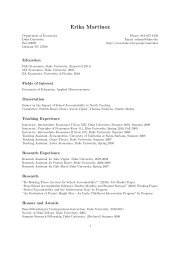Bolívar Distorted: The Effects of Exchange Controls on the ...
Bolívar Distorted: The Effects of Exchange Controls on the ...
Bolívar Distorted: The Effects of Exchange Controls on the ...
You also want an ePaper? Increase the reach of your titles
YUMPU automatically turns print PDFs into web optimized ePapers that Google loves.
Much <str<strong>on</strong>g>of</str<strong>on</strong>g> <strong>the</strong> exchange rate literature written before 2001 tends to support currency boards<br />
and exchange rate pegs as a feasible and possibly effective way <str<strong>on</strong>g>of</str<strong>on</strong>g> reducing inflati<strong>on</strong> and<br />
creating c<strong>on</strong>fidence in a failing currency. <str<strong>on</strong>g>The</str<strong>on</strong>g> primary example <str<strong>on</strong>g>of</str<strong>on</strong>g> this is Est<strong>on</strong>ia, a Baltic<br />
country that instituted a currency board in <strong>the</strong> face <str<strong>on</strong>g>of</str<strong>on</strong>g> hyperinflati<strong>on</strong> and <strong>the</strong> lack <str<strong>on</strong>g>of</str<strong>on</strong>g> c<strong>on</strong>fidence in<br />
a new state’s currency following <strong>the</strong> fall <str<strong>on</strong>g>of</str<strong>on</strong>g> <strong>the</strong> Soviet Uni<strong>on</strong>. <str<strong>on</strong>g>The</str<strong>on</strong>g> board created stability and in<br />
<strong>the</strong> new currency where <strong>the</strong>re was formerly <strong>on</strong>ly chaos and allowed Est<strong>on</strong>ia to make a smooth<br />
transiti<strong>on</strong> from Soviet rule to independent capitalism. 14 Under <strong>the</strong> currency board arrangement,<br />
Est<strong>on</strong>ia reigned in hyperinflati<strong>on</strong> over <strong>the</strong> course <str<strong>on</strong>g>of</str<strong>on</strong>g> a few years by reducing <strong>the</strong> m<strong>on</strong>ey stock,<br />
but also suffered from early negative GDP growth and cuts in social spending. 15 Est<strong>on</strong>ia’s<br />
currency board arrangement, combined with fiscal restraint and str<strong>on</strong>g instituti<strong>on</strong>al reform,<br />
showed that <strong>the</strong> type <str<strong>on</strong>g>of</str<strong>on</strong>g> exchange rate regime is not necessarily critical to <strong>the</strong> ec<strong>on</strong>omic system,<br />
but ra<strong>the</strong>r <strong>the</strong> instituti<strong>on</strong>al arrangement and management that surround it.<br />
However, literature published after 2001 tends to discount more and more <strong>the</strong> idea <str<strong>on</strong>g>of</str<strong>on</strong>g> a<br />
successful currency board being uniformly successful. It claims that currency boards require a<br />
number <str<strong>on</strong>g>of</str<strong>on</strong>g> o<strong>the</strong>r factors in order to be successful, and show that a currency board is not a cure-all<br />
for inflati<strong>on</strong> and instability as some ec<strong>on</strong>omists claim. 16 This change in thought follows <strong>the</strong><br />
collapse <str<strong>on</strong>g>of</str<strong>on</strong>g> <strong>the</strong> Argentinean ec<strong>on</strong>omy. Under <strong>the</strong> enormous duress <str<strong>on</strong>g>of</str<strong>on</strong>g> a mounting external debt<br />
and propping up a failing currency, <strong>the</strong> government was forced to aband<strong>on</strong> c<strong>on</strong>vertibility (<strong>the</strong><br />
ability to change pesos into dollars at a fixed rate) when <strong>the</strong>re were no l<strong>on</strong>ger enough dollars to<br />
back <strong>the</strong> domestic m<strong>on</strong>ey supply. When <strong>the</strong> Central Bank ran out <str<strong>on</strong>g>of</str<strong>on</strong>g> dollars and <strong>the</strong> currency<br />
board collapsed, it propagated a nati<strong>on</strong>al ec<strong>on</strong>omic crisis, replete with bank run and general<br />
havoc. <str<strong>on</strong>g>The</str<strong>on</strong>g> literature cauti<strong>on</strong>s that while <strong>the</strong>re have been failures in certain currency boards, <strong>the</strong><br />
14 Jakob de Haan, et.al. “How to reduce inflati<strong>on</strong>?” 2001.<br />
15 Dennis R. Appleyard and Alfred J Field, Jr. Internati<strong>on</strong>al Ec<strong>on</strong>omics. 2001.<br />
16 Graham Bird. “Cry for Argentina…not for its currency board.” New Ec<strong>on</strong>omy. 2002.<br />
10



